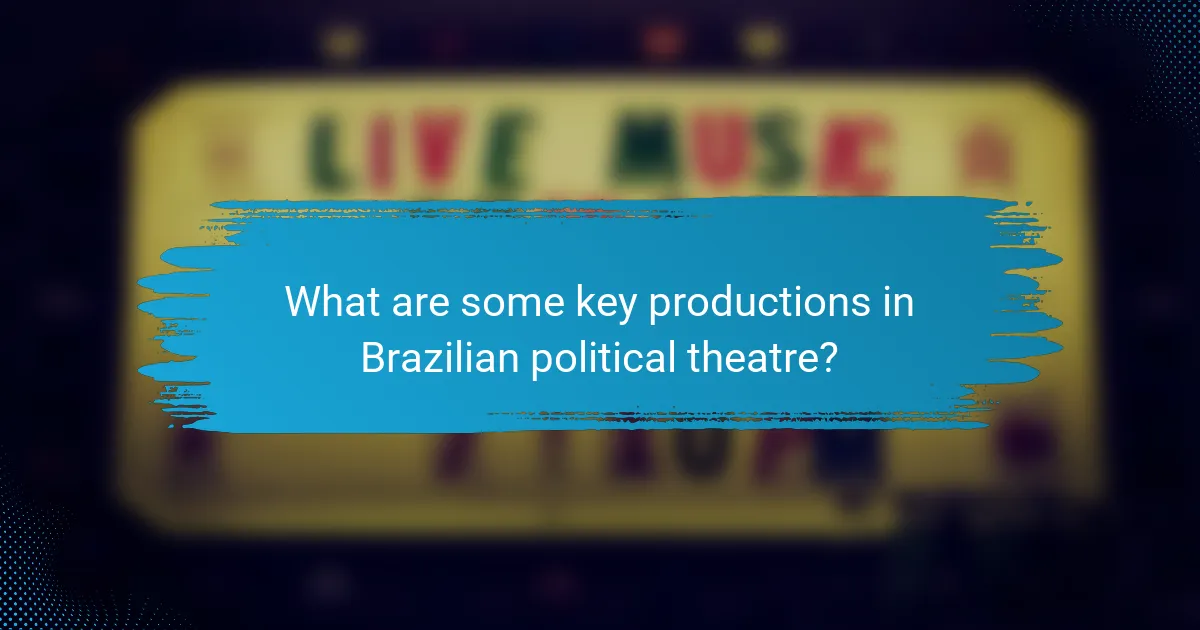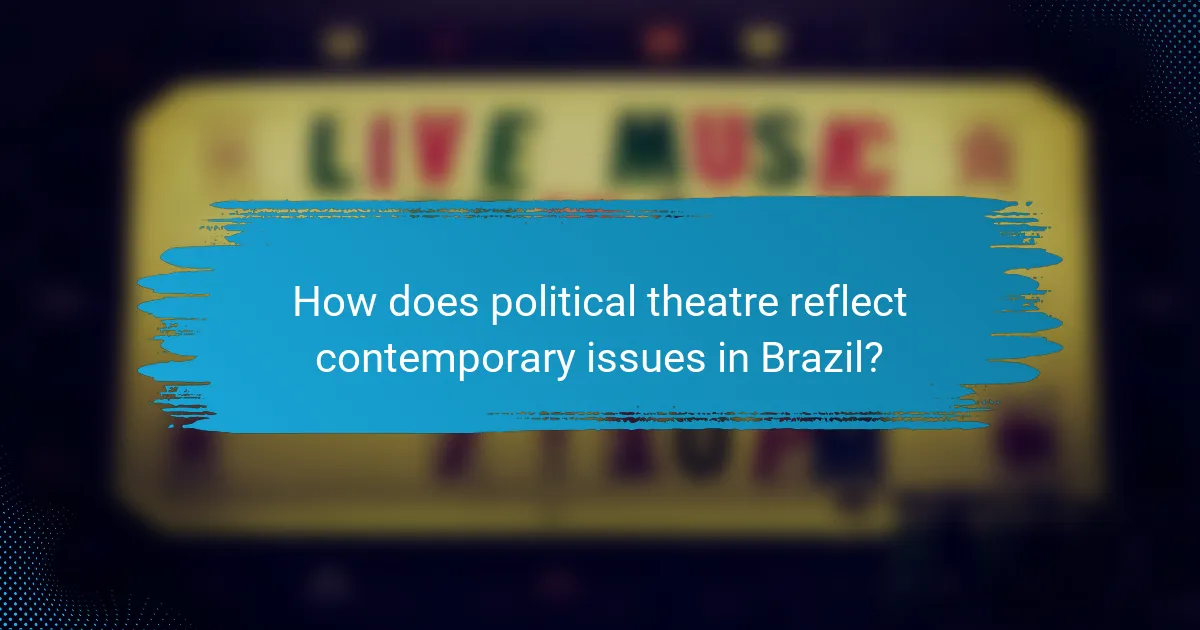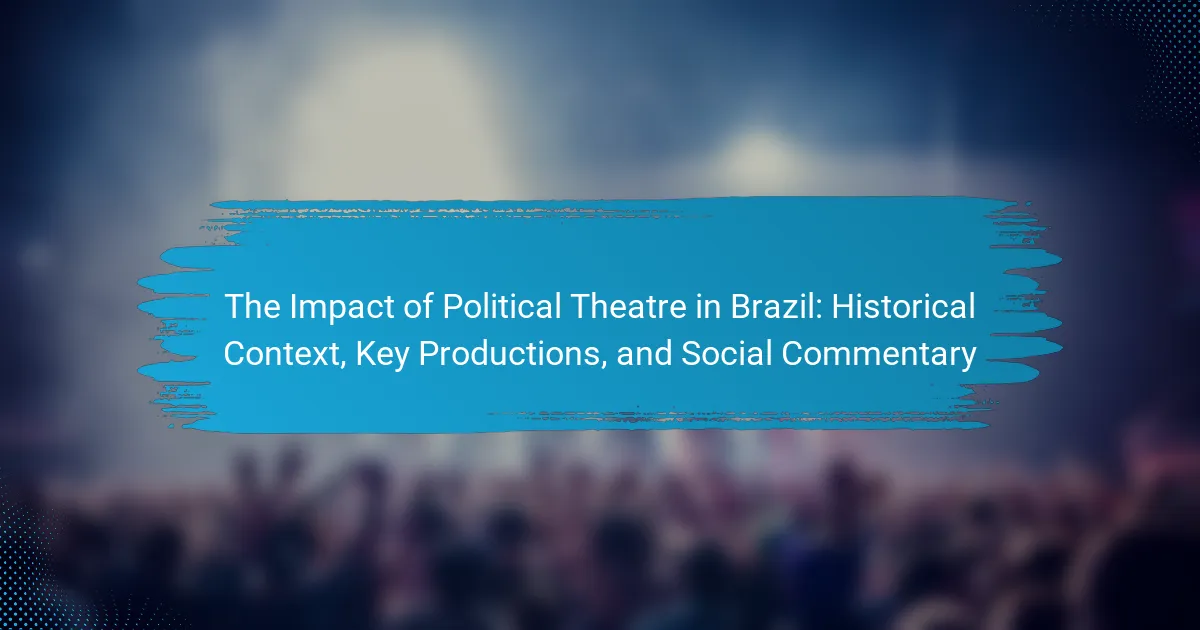Political theatre in Brazil is a significant cultural phenomenon that shapes social and political discourse. It emerged during periods of dictatorship, particularly from 1964 to 1985, serving as a platform for critique of governmental actions and societal issues. Key productions such as “O Rei da Vela,” “A Revolução dos Bichos,” and “Eles Não Usam Black-Tie” address themes of corruption, inequality, and social justice, reflecting Brazil’s socio-political landscape. These performances engage audiences and promote activism, fostering dialogue and awareness on pressing issues. The ongoing influence of political theatre underscores its importance as a tool for social commentary and community mobilization in Brazil.

What is the significance of political theatre in Brazil?
Political theatre in Brazil plays a crucial role in shaping social and political discourse. It serves as a platform for critique and reflection on governmental actions and societal issues. Historically, political theatre emerged during periods of dictatorship, such as the military regime from 1964 to 1985. Productions often addressed censorship, human rights abuses, and social inequality. Notable works, like “O Rei da Vela” by Oswald de Andrade, highlighted economic struggles and class disparities. These performances engaged audiences and encouraged activism. Political theatre continues to influence contemporary Brazilian culture, fostering dialogue and awareness on pressing issues. Its significance lies in its ability to inspire change and mobilize communities.
How has political theatre evolved throughout Brazilian history?
Political theatre in Brazil has evolved significantly since the 19th century. Initially, it emerged as a form of social critique during the Brazilian Empire. The works often addressed issues of monarchy and colonialism. In the 20th century, political theatre gained momentum during periods of dictatorship. It became a tool for resistance against authoritarian regimes. Notable productions during this time included “The Opera of Malandro” and works by Augusto Boal. The post-dictatorship era saw a diversification of themes, incorporating social issues like race and inequality. Contemporary political theatre reflects current political climates and social movements. This evolution illustrates the dynamic relationship between theatre and Brazilian socio-political contexts.
What key historical events have influenced the development of political theatre in Brazil?
The development of political theatre in Brazil has been significantly influenced by key historical events. The military coup of 1964 marked a turning point, leading to censorship and repression. This environment spurred the emergence of underground theatre, where artists used allegory and metaphor to critique the regime. The 1970s saw the rise of Grupo Opinião and other collectives, which brought social issues to the forefront. The end of military rule in the 1980s allowed for a resurgence of political expression in theatre. The 1990s introduced the “Teatro do Oprimido” movement, promoting social change through participatory methods. Each of these events shaped the themes and styles of Brazilian political theatre, reflecting the country’s tumultuous history.
How did political regimes shape the themes and styles of political theatre?
Political regimes significantly influenced the themes and styles of political theatre in Brazil. During authoritarian regimes, theatre often adopted a subversive tone. This was a response to censorship and repression, leading to the use of allegory and metaphor. For instance, the military dictatorship from 1964 to 1985 prompted playwrights to encode political criticism in their works. The themes often revolved around oppression, resistance, and social injustice.
Conversely, during democratic periods, political theatre embraced more direct forms of expression. Playwrights explored themes of freedom, identity, and social equity. The return to democracy in the late 1980s allowed for a broader spectrum of voices and styles. This shift included the incorporation of popular culture and diverse narratives.
Overall, the changing political landscape in Brazil directly shaped the evolution of political theatre, reflecting the societal struggles and aspirations of its time.
What role does political theatre play in social commentary?
Political theatre serves as a vital platform for social commentary. It critiques societal issues and political systems through performance. By using satire and dramatization, it engages audiences emotionally and intellectually. Historical examples, such as the Brazilian Teatro Oficina, highlight its effectiveness in addressing dictatorship and social inequality. Political theatre often reflects public sentiment and encourages dialogue. This form of art can mobilize audiences towards social change. Its impact is evident in how it shapes perceptions of political realities. Overall, political theatre remains a powerful tool for societal reflection and critique.
How do playwrights use political theatre to address social issues?
Playwrights use political theatre to highlight and critique social issues. They create narratives that reflect societal challenges and injustices. This form of theatre often employs satire, drama, and allegory to convey messages. By engaging audiences emotionally, playwrights encourage critical thinking about political and social realities. Historical examples include the work of artists like Augusto Boal, who developed the Theatre of the Oppressed. Boal’s techniques empower marginalized voices and promote social change. Political theatre fosters dialogue and raises awareness about pressing issues, such as inequality and corruption. Through performance, playwrights can mobilize audiences and inspire action for social justice.
What impact does political theatre have on public perception and activism?
Political theatre significantly influences public perception and activism. It serves as a platform for social commentary and political critique. Productions often reflect societal issues, prompting audiences to engage with political discourse. For example, Brazilian political theatre during the military dictatorship raised awareness about human rights abuses. This engagement can mobilize communities towards activism. Historical productions like “The Encounter of the Two Worlds” challenged government narratives and inspired collective action. Studies show that audiences of political theatre are more likely to participate in civic activities. Therefore, political theatre shapes both awareness and activism in society.

What are some key productions in Brazilian political theatre?
Key productions in Brazilian political theatre include “O Rei da Vela,” “A Revolução dos Bichos,” and “Eles Não Usam Black-Tie.” “O Rei da Vela,” written by Oswald de Andrade in 1933, critiques capitalism and social inequality. “A Revolução dos Bichos,” an adaptation of George Orwell’s work, addresses themes of power and corruption. “Eles Não Usam Black-Tie,” by Gianfrancesco Guarnieri, highlights class struggle and labor rights during the military dictatorship. These productions reflect Brazil’s socio-political issues and engage audiences in critical dialogue.
Which notable plays have made significant contributions to political discourse?
“Vidas Secas” by Graciliano Ramos is a notable play that has made significant contributions to political discourse in Brazil. This play explores themes of poverty and social injustice. It reflects the struggles of the Brazilian rural population during the 20th century. “O Pagador de Promessas” by Dias Gomes critiques the intersection of religion and politics. It highlights the manipulation of faith for political gain. “Eles Não Usam Black-Tie” by Gianfrancesco Guarnieri addresses labor rights and class struggle. This play portrays the conflicts between workers and their employers. These works have sparked discussions on social issues and influenced public opinion. They remain relevant in contemporary debates about inequality and governance in Brazil.
What themes are prevalent in these key productions?
Prevalent themes in key Brazilian political theatre productions include social injustice, government corruption, and human rights. These productions often reflect the struggles of marginalized communities. They address the impact of authoritarian regimes on society. Themes of resistance and resilience are also common. Additionally, identity and cultural heritage play significant roles. Many works critique socio-economic disparities. Environmental issues are increasingly represented in recent productions. These themes resonate with audiences and provoke critical dialogue.
How have these productions been received by audiences and critics?
The productions of political theatre in Brazil have generally been well-received by audiences and critics. They often resonate with societal issues, prompting strong emotional responses. Critics frequently praise the performances for their boldness and relevance. Many productions tackle sensitive topics, which can lead to both acclaim and controversy. Audience engagement tends to be high, as these works reflect the socio-political landscape. For instance, plays like “O Rei da Vela” and “Gota d’Água” have sparked significant discussions. Overall, the reception highlights the importance of political theatre in fostering dialogue within Brazilian society.
What are the characteristics of influential Brazilian playwrights?
Influential Brazilian playwrights often exhibit a strong commitment to social and political themes. They address pressing issues such as inequality, injustice, and cultural identity. Their works frequently challenge the status quo and provoke critical thought. Many incorporate elements of Brazilian folklore and regional language. This adds authenticity and depth to their narratives. Collaborative efforts with actors and directors are common, enhancing the theatrical experience. Notable figures like Ariano Suassuna and Nelson Rodrigues exemplify these characteristics. Their plays have significantly shaped Brazilian theatre and influenced public discourse.
Who are the most prominent playwrights in Brazilian political theatre?
The most prominent playwrights in Brazilian political theatre include Augusto Boal, Nelson Rodrigues, and Plínio Marcos. Augusto Boal is known for developing the Theatre of the Oppressed, which encourages audience participation. His works often address social injustices and political repression. Nelson Rodrigues focused on the complexities of Brazilian society, using provocative themes to challenge the status quo. Plínio Marcos highlighted marginalized voices and social issues in his plays. These playwrights significantly shaped the landscape of Brazilian political theatre through their impactful narratives and innovative techniques.
What unique perspectives do these playwrights bring to their works?
Brazilian playwrights bring diverse perspectives shaped by their cultural, historical, and social contexts. They often incorporate elements of Brazilian identity, addressing themes such as inequality and political oppression. For instance, playwrights like Augusto Boal emphasize participatory theatre to engage audiences in social change. Their works reflect the struggles of marginalized communities, providing a voice to the voiceless. Additionally, the historical backdrop of military dictatorship influences their narratives, infusing them with urgency and relevance. This unique blend of personal and collective experiences enriches Brazilian political theatre, making it a powerful medium for social commentary.

How does political theatre reflect contemporary issues in Brazil?
Political theatre in Brazil serves as a mirror to contemporary societal issues. It addresses themes such as corruption, inequality, and social justice. Productions often depict the struggles of marginalized communities. They highlight the political climate and governmental actions affecting citizens. For example, plays like “O Rei da Vela” critique economic disparity. They resonate with audiences by portraying relatable characters and situations. Additionally, political theatre encourages public discourse on pressing matters. It fosters awareness and engagement among viewers. This form of art remains a vital tool for social commentary in Brazil.
What current social and political issues are addressed in recent productions?
Recent productions in Brazilian political theatre address issues such as corruption, social inequality, and human rights violations. These themes reflect the ongoing struggles within the country. For instance, plays often critique government actions and highlight the impact of economic disparity on marginalized communities. Productions like “O Mecanismo” expose the intricacies of political corruption. Additionally, works focusing on the [censured] rights movement emphasize the need for social acceptance and legal protections. The portrayal of police violence in theatre also serves as a commentary on state repression. These issues resonate with audiences, sparking dialogue and reflection on Brazil’s socio-political landscape.
How do modern productions adapt historical themes to contemporary contexts?
Modern productions adapt historical themes to contemporary contexts by reinterpreting events and figures to resonate with current societal issues. This involves using modern language and settings to make historical narratives relatable. For example, themes of oppression from historical events can parallel today’s struggles for social justice. Productions often incorporate multimedia elements to engage contemporary audiences. They also explore diverse perspectives that reflect current cultural dynamics. By doing so, these adaptations create a dialogue between the past and present. This method fosters a deeper understanding of historical relevance in today’s world. Productions like “O Rei da Vela” exemplify this approach, addressing economic inequality while drawing on Brazil’s historical context.
What role does audience engagement play in shaping the impact of political theatre today?
Audience engagement is crucial in shaping the impact of political theatre today. It determines how effectively messages resonate with viewers. Engaged audiences are more likely to reflect on the themes presented. This reflection can lead to increased awareness of social and political issues. Research indicates that interactive elements enhance audience participation. For example, productions that invite audience dialogue foster deeper connections. In Brazil, political theatre often addresses pressing societal concerns. Engaging audiences in these discussions amplifies the theatre’s relevance and influence. Thus, audience engagement directly influences the effectiveness of political theatre in driving social change.
What can audiences learn from engaging with political theatre?
Audiences can learn about social issues and political dynamics through engaging with political theatre. This form of theatre often reflects real-world events and societal challenges. It provides a platform for marginalized voices and perspectives. Audiences gain insights into historical contexts and contemporary struggles. Political theatre encourages critical thinking and dialogue among viewers. It often motivates audiences to take action or engage in advocacy. Research shows that political theatre can influence public opinion and raise awareness on pressing issues. For example, productions addressing Brazil’s military dictatorship have highlighted themes of oppression and resistance, shaping public discourse.
How can political theatre inspire social change and awareness?
Political theatre can inspire social change and awareness by addressing pressing societal issues. It uses performance to engage audiences emotionally and intellectually. Through storytelling, it highlights injustices and promotes critical thinking. Historical examples include the Brazilian theatre movement during the military dictatorship. Productions like “The Passion of the [censured]” challenged government oppression and sparked public discourse. Research indicates that political theatre fosters community dialogue and mobilizes activism. Studies show that audiences often reflect on their beliefs after viewing such performances. Thus, political theatre serves as a catalyst for social transformation.
What are some practical ways to support and engage with political theatre in Brazil?
Attend local performances to experience political theatre firsthand. Engage in discussions with artists and audiences to share perspectives. Volunteer with theatre companies to assist in productions or outreach. Promote political theatre events on social media to increase visibility. Donate to organizations that support political theatre initiatives. Participate in workshops or classes to learn about the craft and themes. Collaborate with local schools to introduce political theatre to students. Advocate for funding and support for political theatre in community forums.
The main entity of the article is political theatre in Brazil. This article examines the historical significance of political theatre, tracing its evolution from the 19th century through periods of dictatorship and democracy. It highlights key productions and influential playwrights, illustrating how they address social issues such as inequality, corruption, and human rights. The role of political theatre in shaping public perception and activism is also discussed, along with the impact of audience engagement in fostering social change and awareness. Overall, the article provides a comprehensive overview of the relationship between political theatre and Brazil’s socio-political landscape.
